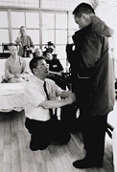Some of the images that people most often associate with Tzu Chi are those of volunteers consoling the elderly, opening a Great Love Village for occupancy, dedicating a new school for a quake-devastated town, or offering free clinics to the uninsured. In other words, these are scenes when Tzu Chi delivers help to the needy.
While these are true images of Tzu Chi, there are other aspects of the foundation's work that are less frequently seen. In this article, we briefly present a little of what needs to be done before Tzu Chi can deliver its services.

Soon after a severe disaster occurs, Tzu Chi volunteers with expertise in many related fields, such as food, clothing, shelter, water purification, transportation, communications, and medicine, immediately gather around Master Cheng Yen to provide ideas, give advice, and await assignments.
Even on normal days, the Master needs to be ready in case of unexpected disasters. She is very much concerned about the safety of Tzu Chi rescue volunteers. Take for example the design of their clothing. Huang Hua-de, one of the Master's disciples, is responsible for research and development. This picture shows him displaying one new sample after another to the Master. He will make modifications later according to her feedback and comments.
His job seems straightforward enough. The uniform for Tzu Chi rescuers must be pleasing to the eye, economical, light, durable, warm, breathable, moisture resistant, easy to clean, and able to reflect light in darkness...
Food for disaster victims also undergoes constant refinement. Texture, nutritional value, local customs, flavor preferences, and even the materials of the containers are all factors that need to be examined closely. On May 30, 2004, Wang Ling-yi, Chen Kuan-bo, and Qiu Yao-shan, et al., came to the Tzu Chi Guandu Compound in Taipei to see the Master. They showed her the food items and shipping and packaging materials that they had developed. Cans of

wheat tea, "eight treasure" porridge, simmered bamboo, vegetarian curry [all foods provided by Tzu Chi worldwide are meatless], and noodles just about filled the tabletop. Master Cheng Yen always emphasizes the importance of quality control. The fact that these instant foods will be given away free to disaster victims does not mean they can be produced with a less attentive attitude. With no drinking water or electricity after a disaster, survivors should be able to just "open and eat" when they receive Tzu Chi food.
The Master emphasized, "We should always give other people things that we'd like to have ourselves." She asked about each item's shelf life, production quantity, transport, and storage. She then invited everyone present to try the food.
The brown rice porridge apparently tasted pretty good because the Master suddenly asked, "Why did I eat three spoonfuls of it?" |